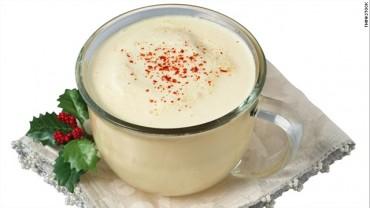
The holiday season brings dietary challenges that even the most health-conscious doctors and patients alike might succumb to. Social functions and parties this time of year offer seemingly endless supplies of chocolate cake pie cookies and other temptations that practically make a person's blood sugar rise just by looking at them. In the midst of all this refined sugar is there anything on a holiday table that might be a better choice?
How about eggnog? Of course we're talking about the homemade variety; when made with high quality ingredients homemade eggnog can provide a surprising amount of beneficial nutrients. The individual ingredients each contribute something important making a glass of the whole greater than the sum of its parts.
Organic whole milk and cream make a wonderful base for eggnog. The attitudes of nutrition professionals toward fat in general and saturated fat in particular have evolved over the years. A growing body of evidence suggests that the saturated fats found in dairy have no association with an increased risk of mortality from cardiovascular disease (CVD) and in fact they may even have an inverse relationship with CVD risk. A recent paper in the American Journal of Clinical Nutrition supported the notion that the longstanding advice to consume low-fat dairy products has little to do with saturated fat's alleged adverse effects on health stating The recommendation for low-fat dairy is more of a philosophical argument to reduce energy intake from fat and added sugar than from evidence of health concerns.
Additionally if the milk and cream come from cows consuming their natural diet of grass and hay the fat will be richer in conjugated linoleic acid (CLA) a naturally-occurring trans fat found in the fat of ruminant animals that are primarily pasture-fed. According to one study milk fat from cows grazing on a pasture with no supplemental feed had 500% more CLA than milk from cows fed corn and corn silage. CLA may be beneficial for body fat loss independent of exercise or other changes in diet. This unique type of fat may also have positive effects on inflammatory markers related to insulin resistance as well as on atherogenic small dense LDL particles.
Eggs are another primary ingredient that contribute to eggnog's nutritional punch. They are of course a great source of protein and they also bring solid amounts of vitamin B12 riboflavin and selenium. The yellow-orange color of the yolks comes from lutein and zeaxanthin carotenoids that may be protective for eye health. Eggs are one of the richest known sources of choline an essential building block for the neurotransmitter acetylcholine which is critical for learning and memory processing. Adequate maternal intake of choline is essential for healthy neurological development in babies during and after gestation. Inadequate choline intake during this critical time can have negative effects on brain development and cognitive function throughout the offspring's life.
Egg yolks are high in cholesterol but as we know that's not a bad thing. Dietary cholesterol is not the villain it's been made out to be. Dietary cholesterol intake has little to no impact on serum levels. In fact egg yolk consumption particularly when combined with a low-carbohydrate diet may even improve dyslipidemia.
Another common addition to eggnog is nutmeg. Like many other warming spices (such as cinnamon ginger turmeric and cayenne) nutmeg has demonstrated beneficial properties for health. It was traditionally used in Southeast Asia for stomach cramps diarrhea nausea and flatulence. Modern research has revealed that nutmeg's essential oil may help protect the liver from oxidative damage and some of the lignans in nutmeg may be protective against oxidation of LDL particles.
For those who avoid dairy eggnog can still be a delicious and nutritious treat made with almond or rice milk. For a boost of healthy medium-chain triglycerides (which may even help with the fight against holiday weight gain) consider using coconut milk and for a lower sugar content stevia and xylitol are sensible substitutes.
Of course these factors don't automatically make eggnog an ideal health food. But compared to Aunt Idas sugar-glazed and candied fruit cake it might be a step up!